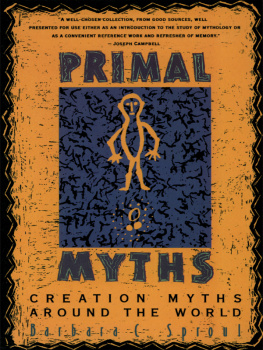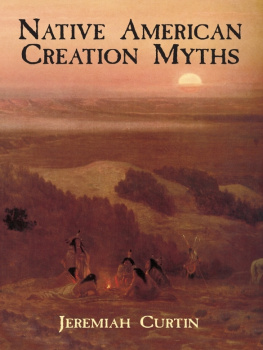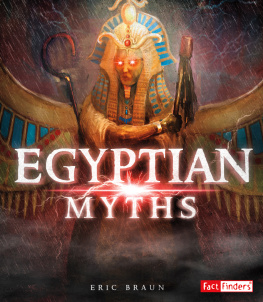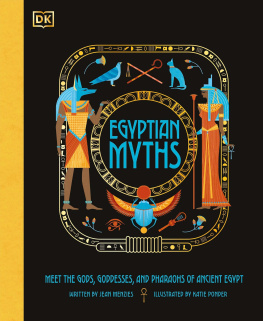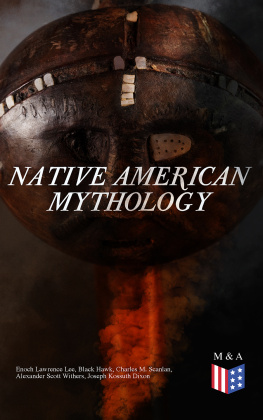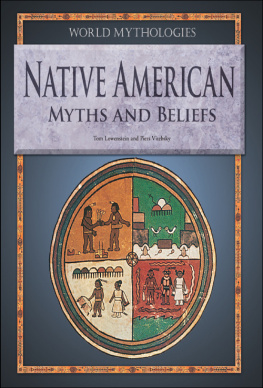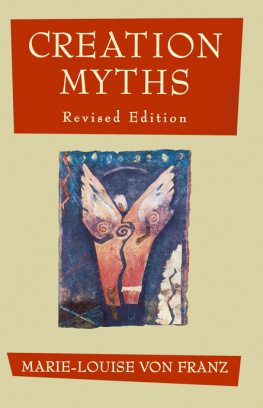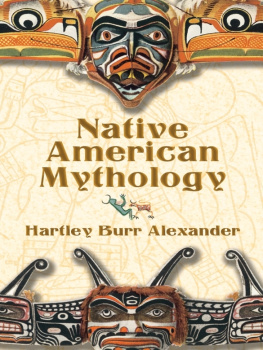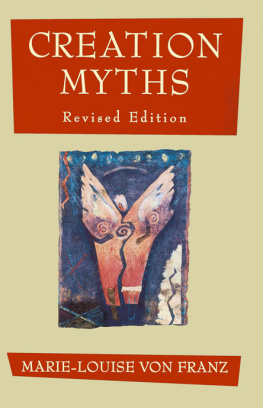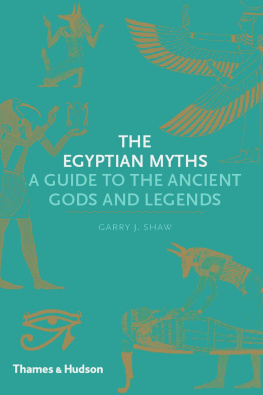Barbara C. Sproul - Primal Myths: Creation Myths Around the World
Here you can read online Barbara C. Sproul - Primal Myths: Creation Myths Around the World full text of the book (entire story) in english for free. Download pdf and epub, get meaning, cover and reviews about this ebook. year: 1979, publisher: HarperOne, genre: Religion. Description of the work, (preface) as well as reviews are available. Best literature library LitArk.com created for fans of good reading and offers a wide selection of genres:
Romance novel
Science fiction
Adventure
Detective
Science
History
Home and family
Prose
Art
Politics
Computer
Non-fiction
Religion
Business
Children
Humor
Choose a favorite category and find really read worthwhile books. Enjoy immersion in the world of imagination, feel the emotions of the characters or learn something new for yourself, make an fascinating discovery.
- Book:Primal Myths: Creation Myths Around the World
- Author:
- Publisher:HarperOne
- Genre:
- Year:1979
- Rating:4 / 5
- Favourites:Add to favourites
- Your mark:
- 80
- 1
- 2
- 3
- 4
- 5
Primal Myths: Creation Myths Around the World: summary, description and annotation
We offer to read an annotation, description, summary or preface (depends on what the author of the book "Primal Myths: Creation Myths Around the World" wrote himself). If you haven't found the necessary information about the book — write in the comments, we will try to find it.
A comprehensive collection of creation stories ranging across widely varying times and cultures, including Ancient Egyptian, African, and Native American.
Primal Myths: Creation Myths Around the World — read online for free the complete book (whole text) full work
Below is the text of the book, divided by pages. System saving the place of the last page read, allows you to conveniently read the book "Primal Myths: Creation Myths Around the World" online for free, without having to search again every time where you left off. Put a bookmark, and you can go to the page where you finished reading at any time.
Font size:
Interval:
Bookmark:

For Herb
PRIMAL MYTHS : Creation Myths Around the World. Copyright 1979 by Barbara C Sproul. All rights reserved under International and Pan-American Copyright Conventions. By payment of the required fees, you have been granted the non-exclusive, non-transferable right to access and read the text of this ebook on-screen. No part of this text may be reproduced, transmitted, down-loaded, decompiled, reverse engineered, or stored in or introduced into any information storage and retrieval system, in any form or by any means, whether electronic or mechanical, now known or hereinafter invented, without the express written permission of HarperCollins ebooks.
FIRST H ARPER C OLLINS EDITION PUBLISHED IN 1991
Library of Congress Cataloging in Publication Data
Sproul, Barbara C.
Primal myths.
Bibliography
Includes index.
1. CreationComparative studies. 1. Title
BL325.C7S68 1979 291.2 78-4429
ISBN 0-06-067501-2
06 07 RRD 30 29 28
EPub Edition MAY 2013 ISBN 9780062285324
In many cultures, creation myths form only the first part of an extended mythological tradition which recounts social and cultural as well as natural foundations of present reality. Such cultures make no firm distinctions between creation myths and socio-cultural ones insofar as they understand no gross separation between themselves and the rest of nature. Therefore many of the myths included in this anthology are somewhat arbitrarily truncatedcut off from the more historical myths which follow themso that in subject matter they might match more closely those explicitly cosmological myths which deal directly with the creation of being, the gods, the universe, and people.
In each case, I have sought the most authentic translationthe version which, even though it might not be as smooth or as easily available to Western readers as another, most authentically evokes its cultural and religious source. For the most part, diacritical marks and footnotes have been omitted as unnecessary for the general reader, but each myth has been introduced with basic information concerning its setting, date, authorship, and main symbols.
To maintain consistency, only book titles have been italicized; the titles of individual myths have not. Partly for the same reason, but also to be clear, the terms God, BeingItself, Not-Being-Itself, and the Holy have been capitalized when they refer to absolute reality. Generic terms for divinities and principles which seem to symbolize only a partial aspect of that reality appear in lower case.
This is only a partial collection of the creation myths of the world: given the limits of one volume, I have tried to choose the most powerful myths, offering examples from each religious tradition and yet avoiding duplication of themes or attitudes. I hope that, by its range, this collection still provides an introduction to the cosmological and theological thinking of the worlds religions.
Among those to whom I am particularly grateful are teachers whose passion for their own subjects has inspired me in pursuit of my own. Isabel Stevens, David Bailey, Joseph Campbell, Ada Bozeman, Maurice Friedman, Roy Finch, Rudolf Arnheim, Tom Driver, and Theodor Gaster have each taught me a great dealnot so much by virtue of the answers they gave but by the questions they askedand I am in their debt.
Barbara C. Sproul
New York City
February 1979
Cover designed by Paul Quin
Australia
HarperCollins Publishers (Australia) Pty. Ltd.
Level 13, 201 Elizabeth Street
Sydney, NSW 2000, Australia
http://www.harpercollins.com.au
Canada
HarperCollins Canada
2 Bloor Street East20th Floor
Toronto, ON, M4W, 1A8, Canada
http://www.harpercollins.ca
New Zealand
HarperCollins Publishers (New Zealand) Limited
P.O. Box 1
Auckland, New Zealand
http://www.harpercollins.co.nz
United Kingdom
HarperCollins Publishers Ltd.
7785 Fulham Palace Road
London, W6 8JB, UK
http://www.harpercollins.co.uk
United States
HarperCollins Publishers Inc.
10 East 53rd Street
New York, NY 10022
http://www.harpercollins.com
BARBARA SPROUL IS DIRECTOR OF THE P ROGRAM IN R ELIGION AT H UNTER C OLLEGE OF THE C ITY U NIVERSITY OF N EW Y ORK.
Visit www.AuthorTracker.com for exclusive information on your favorite HarperCollins authors.
T HE MOST PROFOUND human questions are the ones that give rise to creation myths: Who are we? Why are we here? What is the purpose of our lives and our deaths? How should we understand our place in the world, in time and space? These are central questions of value and meaning, and, while they are influenced by issues of fact, they are not in themselves factual questions; rather, they involve attitudes toward facts and reality. As such, the issues that they raise are addressed most directly by myths.
Myths proclaim such attitudes toward reality. They organize the way we perceive facts and understand ourselves and the world. Whether we adhere to them consciously or not, they remain pervasively influential. Think of the power of the first myth of Genesis (12:3) in the Old Testament. While the scientific claims it incorporates, so obviously at odds with modern ones, may be rejected, what about the myth itself? Most Westerners, whether or not they are practicing Jews or Christians, still show themselves to be the heirs of this tradition by holding to the view that people are sacred, the creatures of God. Declared unbelievers often dispense with the frankly religious language of this assertion by renouncing God, yet even they still cherish the consequence of the myths claim and affirm that people have inalienable rights (as if they were created by God). And, further, consider the beliefs that human beings are superior to all other creatures and are properly set above the rest of the physical world by intelligence and spirit with the obligation to govern itthese beliefs are still current and very powerful. Even the notion that time is properly organized into seven-day weeks, with one day for rest, remains widely accepted. These attitudes toward reality are all part of the first myth of Genesis. And whether people go to temple or church, whether they consider themselves religious, to the extent they reflect these attitudes in their daily behavior, they are still deeply Judeo-Christian.
But the power of a specific myth is not as important to realize as the power of myth itself. Indeed, each of the claims made by the first Genesis myth has been attacked from some quarter. What is essential to understand is that they have been challenged not by new facts but by new attitudes toward facts; they have been challenged by new myths.
There is no escaping our dependence on myth. Without it, we cannot determine what things are, what to do with them, or how to be in relation to them. The fundamental structures of understanding that myths provide, even though in part dictated by matter and instinct, are nevertheless essentially arbitrary because they describe not just the real world of fact but our perception and experience of that world.
This is true even when we try to understand our selves. How do we approach the most basic question of personal identity? Who is the I who is perceiving and experiencing the world? Initially, we presume identity is a physiological reality evident in a bodys ability to distinguish between me (affirmed and protected by my bodys defenses) and not-me (denied, attacked, and rejected, as happens in transplant operations). But, even though it rests on so firm a physical foundation and is so settled in instinct, the fact of identity is still variously determined by people. With growing intelligence and the progressive freedom that results from it, people construct other than purely reactive, physical ways of responding to and interacting with their environments. I is no longer synonymous with body. Indeed, the question is instantly complicated as time enters into consciousness with memory and imagination and you ask which body you identify with. Todays? Yesterdays? The body you will have a month from now if you go on a diet? The body you had as a child? And, as people add more factors to the structural grid of understanding, identity grows to include other matters. Gender, race, profession, nationality, age, position, and the like all become relevant as the I in all those bodies comes to think of itself as something constant and essentially connected to larger social realities. In many cases, such identifications are so powerful that they overcome the initial one of I equals body. People begin to make distinctions between various aspects of a complex I; they value some as higher selves and others as lower, and they make choices emphasizing one at the expense of another. This is what happens in wartime when people who have come to identify themselves not only physically but also nationally willingly sacrifice their body selves to their citizen selves.
Font size:
Interval:
Bookmark:
Similar books «Primal Myths: Creation Myths Around the World»
Look at similar books to Primal Myths: Creation Myths Around the World. We have selected literature similar in name and meaning in the hope of providing readers with more options to find new, interesting, not yet read works.
Discussion, reviews of the book Primal Myths: Creation Myths Around the World and just readers' own opinions. Leave your comments, write what you think about the work, its meaning or the main characters. Specify what exactly you liked and what you didn't like, and why you think so.

